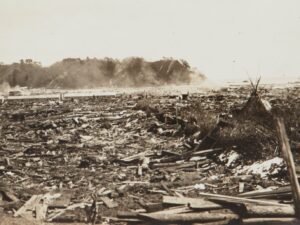publications
What Japan’s Past Disasters Can Teach about the Age of Climate Change

Rüegg, Jonas: “What Japan’s Past Disasters Can Teach about the Age of Climate Change,” Wasshoi! Magazine 7 (2023), 70–85.
https://www.wasshoimagazine.org/magazine/issue7-winter-202324
On March 11, 2011, a giant tsunami overran the reactors of Fukushima Daiichi, a nuclear powerplant built on the shoreline of one of the most seismic zones on earth. With the triple disaster that ensued – an earthquake, tsunami, and nuclear meltdown – a broader awareness emerged that ‘natural’ disasters are never simply ‘natural.’ To call “3/11” an ‘enviro-technical disaster,’ as suggested by scholars in the aftermath, expresses a more profound reconfiguration of the human relationship with an altered and transforming global environment. With sea levels rising, a ‘mass extinction event,’ and an unprecedented hike in atmospheric CO2, the global environment in the twenty-first century can no longer be separated from humans, their politics, and their biases.
As the moss-covered warnings from the past in the disaster zones of northeastern Japan show, lessons from the past are not learned by archiving, but by including marginalised voices into an ongoing conversation. Exclusive systems of expertise and authority tend to overrule past experiences. Instead, as consortia of scholars from various disciplines demand, living in the new ‘riskscape’ of climate change necessitates new, multi-disciplinary systems of knowledge that transcend scientific and humanistic knowledge and are attuned to perceived realities on the ground.
Download “Ruegg-2023-Wasshoi.pdf”
Ruegg-2023-in-Wasshoi.pdf – Downloaded 73 times – 7.10 MB